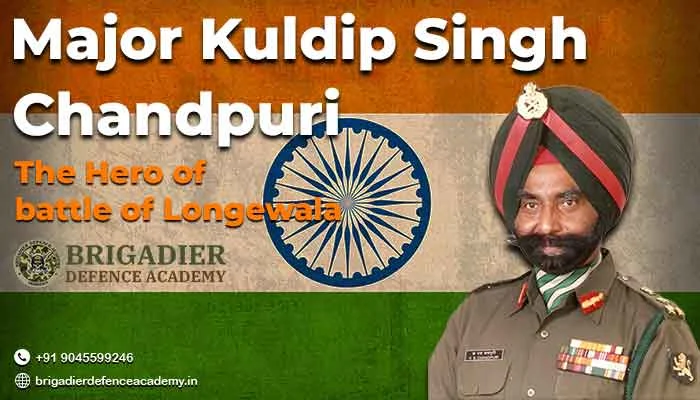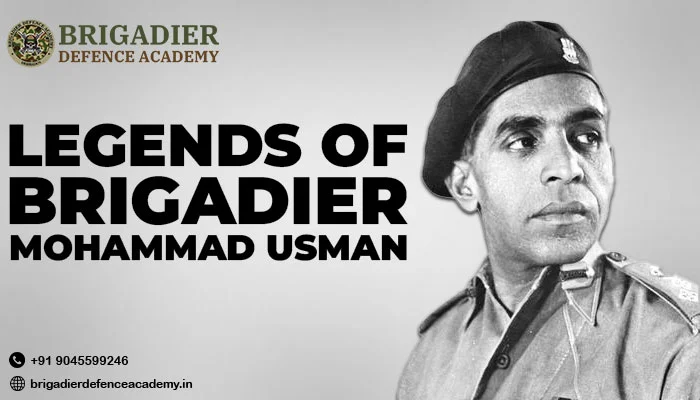Recent Posts

Mission 2025 Begins: NDA-II & CDS-II Notifications Officially Released!


The Life and Bravery of Subedar Yogendra Singh Yadav

The Life and Bravery of Major Kuldip Singh Chandpuri

The Life of Brigadier Mohammad Usman and His Legends of War

The Life of Captain Vikram Batra: Hero of the Kargil War

The Inspiring Journey of Ex-Field Marshal Sam Manekshaw

NDA I 2025 Exam Syllabus

Agniveer 2025 Syllabus and How to Prepare

Agniveer Recruitment 2025: Eligibility Criteria and Physical Standards

Field Marshal Sam Manekshaw is a name etched in gold in the annals of Indian military history. Known for his exemplary leadership, unwavering courage, and sharp wit, Sam Manekshaw’s journey from a young cadet to becoming India’s first Field Marshal is a tale of inspiration, valor, and service to the nation. His legacy continues to motivate generations of armed forces personnel and citizens alike.
Early Life and Education
Field Marshal Sam Manekshaw was born on April 3, 1914, in Amritsar, Punjab, into a Parsi family. His father, Hormusji Manekshaw, was a doctor who had served in the British Army during World War I. Sam had a disciplined upbringing and was known for his curious nature and leadership skills from an early age. After completing his schooling at Sherwood College, Nainital, he initially aimed to study medicine like his father but instead joined the Indian Military Academy (IMA) in Dehradun in 1932.
He was among the first batch of cadets at IMA and soon stood out for his sharp intellect, confidence, and commitment. This was the beginning of a long and illustrious military career that would span over four decades.
Early Military Career
After commissioning into the British Indian Army in 1934, Sam Manekshaw joined the 2nd Battalion of the Royal Scots and later transferred to the 12th Frontier Force Regiment. During World War II, he saw active combat in Burma (now Myanmar) against Japanese forces. In one of the most significant battles, he was severely wounded and presumed dead. However, thanks to timely medical intervention, he survived.
This early brush with death did not deter his spirit. Instead, it cemented his resolve and brought him recognition. He was awarded the Military Cross for his bravery—an honor given only to those who demonstrated exceptional gallantry in combat.
Role in Post-Independence India
After India gained independence in 1947, Field Marshal Sam Manekshaw continued to serve with dedication. He played a crucial role in reorganizing the Indian Army, which was undergoing a major transformation after the partition. His strategic insights and leadership qualities made him an indispensable part of the military hierarchy.
During the Indo-China War in 1962, though he wasn’t directly involved in combat, he openly expressed his disagreement with the political and military leadership’s lack of preparedness. This earned him a reputation as a bold and honest officer who wasn’t afraid to speak the truth.
The Indo-Pak War of 1971
Field Marshal Sam Manekshaw’s most significant contribution came during the Indo-Pak war of 1971, which led to the creation of Bangladesh. As the Chief of Army Staff, his leadership during this war is considered one of the finest military strategies executed by India.
When Prime Minister Indira Gandhi asked him if the Indian Army was ready for war in April 1971, Sam Manekshaw candidly replied that the army needed more time to prepare. This honesty could have cost him his job, but Indira Gandhi trusted his judgment. The war eventually began in December 1971, and in just 13 days, India emerged victorious.
Over 90,000 Pakistani soldiers surrendered to the Indian Army—the largest military surrender since World War II. This triumph was a testament to Field Marshal Sam Manekshaw’s strategic planning, coordination, and ability to inspire his troops.
Becoming India’s First Field Marshal
In recognition of his exceptional service, leadership, and contribution to the 1971 war, Sam Manekshaw was promoted to the rank of Field Marshal in January 1973. He was the first Indian Army officer to be awarded this five-star rank.
The title of Field Marshal is not just a rank; it is a symbol of lifelong service and honor. Even after retirement, he remained a respected figure, offering guidance and speaking on matters of national security and defense.
Legacy and Leadership Style
What made Field Marshal Sam Manekshaw stand apart was not just his military acumen but his charismatic personality. He was known for his wit, eloquence, and the ability to lead with both authority and compassion. His speeches were laced with humor, but they carried profound wisdom.
He believed in empowering his junior officers and was known to walk the extra mile to boost the morale of his troops. His philosophy was simple: “If a man says he is not afraid of dying, he is either lying or he is a Gorkha.”
Field Marshal Sam Manekshaw set a precedent for what military leadership should look like—disciplined, strategic, and humane. His vision for a strong, self-reliant Indian military force shaped defense policies and training standards for decades.
Honoring a National Hero
Field Marshal Sam Manekshaw passed away on June 27, 2008, in Wellington, Tamil Nadu. Despite his unparalleled contribution to the nation, his funeral saw a low official presence, which sparked criticism. However, the love and respect of the Indian people for their Field Marshal remain unshaken.
His legacy lives on through numerous institutions, awards, and military doctrines inspired by his leadership. Statues and busts of Field Marshal Sam Manekshaw stand proudly in military academies, reminding cadets of the path of honor and courage.
Quotes That Reflect His Brilliance
- “I wonder whether those of our political masters who have been put in charge of the defense forces can distinguish a gun from a howitzer.”
- “You mind your own business and I will mind mine. You mind your own army, I will mind mine.”
- “Gentlemen, I have arrived and there will be no withdrawal without written orders and these orders shall never be issued.”
Conclusion
The journey of Field Marshal Sam Manekshaw is one of grit, valor, and excellence. From surviving near-fatal wounds in World War II to leading India to a decisive victory in 1971, his story is a masterclass in leadership and resilience.
Field Marshal Sam Manekshaw not only defended the nation’s borders but also its honor. He remains a towering figure in India’s military history, a beacon for current and future generations. The title of Field Marshal was not just earned—it was lived, every single day of his life.
To learn about more inspiring journeys like this then follow the The Devbrat Sir Code channel on WhatsApp: https://whatsapp.com/channel/0029Va5H6or8F2p777rpcQ2m
FAQs
- What was Ex-Field Marshal Sam Manekshaw’s most significant contribution?
His most significant contribution was leading the Indian Army to victory in the 1971 Indo-Pak War, resulting in the creation of Bangladesh. - Why was Sam Manekshaw promoted to Field Marshal?
He was promoted to Field Marshal in 1973 for his exemplary leadership during the 1971 war, marking him as India’s first Field Marshal. - What was Sam Manekshaw’s leadership style?
His leadership style was strategic, bold, and people-oriented, emphasizing soldier welfare and professional competence. - How did Sam Manekshaw contribute to India’s military post-independence?
He played a crucial role in India’s defense restructuring, advised during the 1947-48 Kashmir war, and helped modernize the Indian Army. - Where did Ex-Field Marshal Sam Manekshaw spend his last years?
He spent his retirement in Coonoor, Tamil Nadu, leading a simple and peaceful life until his passing in 2008.





